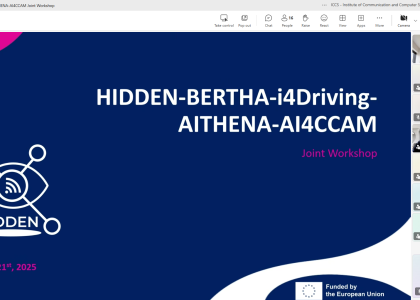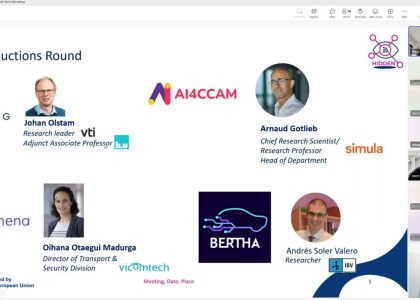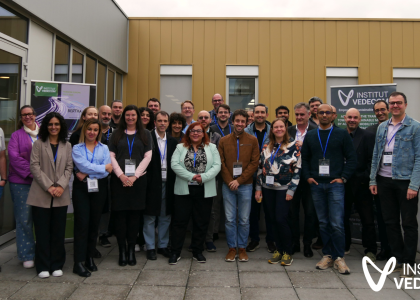
BERTHA
Horizon Europe project meant to develop a Driver Behavioural Model to make autonomous vehicles safer and more human-like
Know moreAbout the BERTHA project
BERTHA is an EU project that brings together 14 research centres, leading universities, and innovative companies from 6 different countries to develop a Driver Behavioural Model (DBM) that can be used in connected autonomous vehicles to make them safer and more human-like.
Within 3 years and with more than €7.9 million funds from the European Union, the Horizon Europe project will develop a scalable and probabilistic Driver Behavioural Model (DBM), mostly based on the Bayesian Belief Network. Following a human-in-the-loop approach, this model will be key to achieving more human-like autonomous vehicles, thus increasing road safety.
The resulting DBM will be implemented on an open-source HUB, a repository that will allow industrial validation of its technological and practical feasibility and become a unique approach for the model’s worldwide scalability.



The BERTHA project will develop a scalable and probabilistic Driver Behavioural Model (DBM), mostly based on the Bayesian Belief Network, which will be key to achieving more human-like autonomous vehicles, thus increasing road safety.

The DBM will also be translated into the CARLA simulator, an open-source driving simulator for autonomous vehicles’ research developed by Computer Vision Centre. Implementing BERTHA’s DBM will use diverse demos which allow the building of new driving models in the vehicle simulator. This can be embedded in different immersive driving simulators, such as HAV from IBV.
The BERTHA project will also develop a methodology which, thanks to the HUB, will share the model with the scientific community to ease its growth. Moreover, its results will include a set of interrelated demonstrators to show the DBM approach to design human-like, easily predictable, and acceptable behaviour of autonomous driving functions in mixed traffic scenarios.
Work packages
Driver Behavioural Model
The primary objective of WP1 is to develop a robust and scalable probabilistic Driver Behavioural Model (DBM) that comprehensively…
Human driving performance data collection
WP2 aims at defining, from the envisaged behaviour modelling, the indicators necessary for its realization and validation, providing a…
Open human behaviour data HUB development
WP3’s objective is to develop a working prototype for a decentralised, cloud-scalable platform that offers collaborative workflows as a…
Evaluate human Driver Behavioural Models for simulating downstream driving tasks
The goal of WP4 is to demonstrate the usefulness of BERTHA’s DBMs. This involves the implementation and execution of…
Acceptance and safety standard CCAM tests
WP5 aims to evaluate the acceptance and safety performance of the Cooperative, Connected and Automated Mobility solutions developed in…
Exploitation and dissemination
WP6 aims to improve the project’s impacts by concentrating on dissemination, exploitation, and communication initiatives. This involves the communication…
Management
WP7 is designed to streamline the comprehensive management of the ongoing EU project. It provides essential resources for each…
-
Workpackage 1
Driver Behavioural Model
The primary objective of WP1 is to develop a robust and scalable probabilistic Driver Behavioural Model (DBM) that comprehensively encompasses key facets of human driving performance, spanning a wide spectrum of drivers and influencing factors. This sophisticated model will initially adopt a Bayesian learning methodology coupled with complementary approaches, fostering the gradual evolution of a concise yet comprehensive model.
Emphasizing the diversity in driver styles and varied driving scenarios, WP1 aims to build a model structured around distinct modules: Perception, Risk Awareness rooted in relevant cognitive states, Decision-Making, Affective, and Motor modules.
-
Workpackage 2
Human driving performance data collection
WP2 aims at defining, from the envisaged behaviour modelling, the indicators necessary for its realization and validation, providing a consensus definition for each of these indicators and all their parameters. We will also define a robust methodology to extract, store and share consistent data from the data HUB coming from different data sources.
This data set will massive data of behaviour gathered with sociological approaches with reduced sets of experimental data to deepen the internal processes of drivers through the analysis of their behaviour and emotional state with different devices in lab conditions and naturalistic driving via FOT.
-
Workpackage 3
Open human behaviour data HUB development
WP3’s objective is to develop a working prototype for a decentralised, cloud-scalable platform that offers collaborative workflows as a building block to improve models of traffic participants (drivers, pedestrians, and others). This platform will include a simulation and collaborative benchmarking environment that allows standardised upload, use, or download of stored traffic participant models/modules, as well as standardised community-driven testing and benchmarking of ADAS, autopilots and traffic participants.
To achieve these functionalities, we will develop during this work package a prototype of workflow that allows collaborative, continuous improvement of AD-pilots and traffic participant models at the Automotive ecosystem level beyond the classic OEM-driven industry.
-
Workpackage 4
Evaluate human Driver Behavioural Models for simulating downstream driving tasks
The goal of WP4 is to demonstrate the usefulness of BERTHA’s DBMs. This involves the implementation and execution of autonomous driving related tasks, where the DBM plays a core role. Some of these tasks assume simulation via BERTHA’s HUB and CARLA simulator, where specific scenes and scenarios, including corner cases, are semi-automatically created. In this case, both industrial pipelines and sensorimotor models for autonomous driving are considered.
BERTHA’s DBMs are expected to bring more fidelity to the simulated behaviours. Other tasks will focus on real-world vehicles offering a certain level of autonomous driving. In this case, BERTHA’s DBMs are expected to bring more naturalistic adjustments.
-
Workpackage 5
Acceptance and safety standard CCAM tests
WP5 aims to evaluate the acceptance and safety performance of the Cooperative, Connected and Automated Mobility solutions developed in the frame of the EU project. Along the work package, different scenarios will be defined, prepared, and conducted to verify not only the efficiency of the measures established, but also to understand the perception of different users’ profiles and different driving environments and situations, attending to human-driver behavioural aspects.
Tests will be performed in several traffic conditions and will be highly instrumented to record quantitative and qualitative parameters that will help to assess the solutions and models generated.
-
Workpackage 6
Exploitation and dissemination
WP6 aims to improve the project’s impacts by concentrating on dissemination, exploitation, and communication initiatives. This involves the communication and dissemination of project progress and results to the appropriate audiences and the development of exploitation strategies for any relevant technologies and concepts produced throughout the Horizon Europe project. WP6 is also responsible for coordinating data management in the consortium and ensuring compliance with GDPR and intellectual property rights (IPR).
Moreover, the BERTHA project will contribute, upon invitation by the CINEA, to common information and dissemination activities to increase the visibility and synergies between HE/H2020 supported actions. The beneficiaries of BERTHA will commit to reporting their results to the European Partnership on Connected, Cooperative and Automated Mobility (CCAM), including providing necessary data to enable the monitoring of CCAM KPIs.
-
Workpackage 7
Management
WP7 is designed to streamline the comprehensive management of the ongoing EU project. It provides essential resources for each work package, ensuring the timely completion of milestones with satisfactory outcomes. Backed by two key processes, the technical project management is fortified: one focuses on harmonizing legal, contractual, financial, and administrative facets, while the other concentrates on rigorous risk assessment.
This involves identifying, evaluating, and prioritizing risks, followed by the implementation of tailored contingency measures. Through these integrated processes, the consortium is assured of realizing both project and innovation objectives seamlessly.
The BERTHA project consortium
Instituto de Biomecánica de Valencia
Institut VEDECOM
University Gustave Eiffel
German Research Centre for Artificial Intelligence
Computer Vision Center
Capgemini Engineering
VORTEX-CoLab
AUMOVIO
Fundación CIDAUT
Austrian Institute of Technology
Universitat de València
Europcar Mobility Group
FI Group
Smart Eye AB
-
Instituto de Biomecánica de Valencia
The Instituto de Biomecánica (IBV) is an R&D&I centre of 165 professionals, where they study the behaviour of the human body and its relationship with the products, environments and services that people use. At IBV they develop and transfer scientific knowledge and technologies to improve people’s health, well-being and quality of life, adding value to companies and the social and economic environment, leaning on human human-centred approach.
Always people-centred, they organize their scientific knowledge through 5 areas: 3D Anthropometry, Human Factors, Biomedical Engineering, Digital Health, and User Experience.
Applying the knowledge in multiple sectors generates R&D&I in response to the challenges of each area. HAV, the dynamic Human Autonomous Vehicle simulator, will be used to provide immersive experiences to get in-depth on the internal mechanisms that determine driving actions and the personal and cultural factors that impact driving decisions.
-
Institut VEDECOM
Created in February 2014, VEDECOM is an Institute for Energy Transition (ITE), dedicated to individual, carbon-free and sustainable mobility, established as part of the French governmental plan ‘Investment for the future'. It contributes to the 'Autonomous vehicle plan', which was recently incorporated into the Solution for Future Industry Programme Alongside Eco-mobility; both of which are part of ‘Nouvelle France Industrielle', the government's plan to invigorate the country's industry.
As a public-private partnership-based foundation, VEDECOM is based on an unprecedented collaboration between industries of the automotive and aerospace sectors, infrastructure and services operators in the mobility eco-system, academic research institutions and local authorities.
VEDECOM aims at becoming a European innovation leader in the fields of electrified vehicles, autonomous and connected cars and new infrastructure and services for shared mobility and energy. VEDECOM’s research is focused on three areas: Vehicle electrification, connected and automated driving, and shared mobility and energy. Also, VEDECOM acts as an approved training institution by offering expert training and raising public awareness surrounding innovative mobility solutions.
PSA Group, Groupe Renault, Valeo, Université Gustave Eiffel (ex: Ifsttar), Transdev, the Paris-Saclay development authority and the engineering school ESTACA are some of VEDECOM’s members.
-
University Gustave Eiffel
University Gustave Eiffel is a French public university working on innovations for smart cities, future transportation systems and road safety.
The LESCOT Laboratory, involved in the BERTHA project, specialises in Ergonomics and Cognitive Sciences and works on different topics related to mobility and road safety, including Human Driver Modelling (cf. COSMODRIVE model) and the Virtual Human-Centred Design (V-HCD) of future driving aids and autonomous vehicles.
-
German Research Centre for Artificial Intelligence
The German Research Centre for Artificial Intelligence (DFKI) was founded in 1988 as a non-profit public-private partnership. In the field of innovative commercial software technology using Artificial Intelligence, DFKI is the leading research centre in Germany.
Based on application-oriented basic research, DFKI develops product functions, prototypes and patentable solutions in the field of information and communication technology. Research and development projects are conducted in 28 research departments, nine competence centres and eight living labs.
DFKI conducts research on "human-centric AI" in the major groundbreaking areas of AI research and applications with a focus on socially relevant topics and scientific excellence. The DFKI Augmented Vision department located in Kaiserslautern specializes in computer vision AI for applications in robotic perception, autonomous driving and human understanding.
-
Computer Vision Center
CVC is a non-profit institution founded in 1995 by the Generalitat de Catalunya and the Universitat Autònoma de Barcelona (UAB). CVC is also a CERCA centre. Its mission is to conduct research of renowned quality and international impact in the field of computer vision, transfer knowledge to companies and society, and train high-level scientists.
CVC is actively involved in both high-quality research and development, contributing to increased knowledge, innovation, and industrial competitiveness. The centre collaborates with companies and undertakes technological projects in various areas, such as autonomous driving, personalized medicine, industry 4.0, human-computer interaction, and intelligent document analysis.
-
Capgemini Engineering
As world leaders in Engineering and R&D services, Capgemini Engineering help its clients accelerate their journey towards the intelligent industry. It brings them global expertise and capabilities, cutting-edge technologies in digital and software, agile engineering platforms, and an industrialized delivery model.
With more than 60,000 engineers and scientists across the globe, Capgemini Engineering unleashes the potential of R&D and innovation to help companies engineer smart products, optimized operations, new customer experiences, and new sources of value.
Role
WP3 leader
Country
Germany
Website
www.capgemini.com/about-us/who-we-are/our-brands/capgemini-engineering/
-
VORTEX-CoLab
VORTEX-CoLab is a collaborative laboratory in cyberphysical systems and cybersecurity whose vision is to create outstanding innovations that have a meaningful impact in industry and society. VORTEX-CoLab’s innovation model thrives on combining academic insights and business mindsets to build acceleration programs with focus on raising the level of technological maturity of new research coming from our scientific partners and demonstrating their applicability in the automotive, aerospace, telecommunications, medical devices and energy sectors.
Using collaboration and diversity of knowledge as cornerstones, VORTEX-CoLab fosters a creative and open-minded culture to produce original combinations of innovative solutions and cutting-edge proof-of-concepts to create products that go far beyond just meeting customers’ expectation.
It prototypes and scales products and services all the way from concept to market. It partners with organisations using co-creation to accelerate technology transfer. It collaborates with academic experts to conduct applied research that drives the field forward.
-
AUMOVIO
AUMOVIO is the spin-off of Continental automotive with around 87,000 employees worldwide.
AUMOVIO is the adaptive Powerhouse for Future Mobility, making it safe, exciting, connected, and autonomous. To achieve this goal, AUMOVIO develop, produce and supply technologically leading and market-oriented products, hardware, software and modern mobility solutions.
In addition, we offer various services. Our diverse portfolio features a multitude of extremely well-established products and underpins our strong market position.
The department involved in the BERTHA project specialises in cutting-edge AI, machine learning, and computer vision solutions that address complex technological challenges. In addition, it develops customised solutions for demanding tasks and adapts proven large-scale automotive technologies for industrial applications.
-
Fundación CIDAUT
Fundación CIDAUT is a research and development centre whose objective is research, development, and innovation of new technologies in the industrial sector, especially in the field of transport and energy and the environment.
The activities carried out from the centre are intended to cover the needs of companies and enhance their competitiveness and industrial development.
The centre carries out R&D projects that can be framed within the following areas: sustainable, intelligent and integrated transport; advanced materials and new processes- circular economy; mobility and security; energy and environment; technology of the information and communication; and industry 4.0.
The Fundación CIDAUT work methodology, consisting of addressing all the stages associated with the development of a new product, from the conception of the idea to pre-industrialization, going through the characterization of materials, the simulation of their behaviour and processing, the conception and design of prototypes and, finally, the validation.
-
Austrian Institute of Technology
The AIT (Austrian Institute of Technology) is Austria's largest research and technology organisation and represents Austria’s commitment to more research and to secure Austria’s position as a hotbed of innovation. Despite being deeply rooted in Austria, the AIT is also a major player internationally.
According to its mission, AIT is strategically positioned as a key player in the European innovation system by performing applied research for and enabling the market exploitation of innovative infrastructure related solutions.
The Digital Resilient Cities team within AIT's Centre for Energy develops urban management and planning solutions for the sustainable, smart, liveable, and resilient living spaces of tomorrow. The team consists of experienced experts with a wide range of technical and professional backgrounds, including urban planners, architects, transport experts, energy experts, spatial planners, statisticians, geoscientists, and information scientists, who develop innovative solutions in an interdisciplinary approach.
-
Universitat de València
Today’s Universitat de València is the outcome of more than five centuries of history that have led to the accumulation of knowledge and unique documentary treasures, making it one of the top Spanish universities. Initially dedicated to the studies of medicine, humanities, theology and law, the university has witnessed over the past decades an accelerated process of transformation and growth.
This significant effort has turned the Universitat de Valencia into a modern, global university. It has become a leader when it comes to the application of new technologies, connected to important international scientific and teaching networks. It has become one to the top five scientific centres in Spain thanks to its commitment to excellence and to the wide range of teaching and research activities offered in all areas of knowledge (basic sciences and engineering, health sciences, educational sciences, humanities and social sciences, economics, and law).
-
Europcar Mobility Group
Europcar Mobility Group is a global mobility services provider, with a leading position in Europe. In the coming years, the Group's ambition is to become a leader in sustainable mobility services, driven by data, technology, and people.
Europcar Mobility Group offers to individuals and businesses a wide range of car and van rental services, be it for a few hours, a few days, a week, a month or more, on-demand or on subscription, relying on a fleet of more than 250,000 vehicles, equipped with the latest engines including more and more electric vehicles.
Its brands address differentiated needs, use cases and expectations: Europcar® - a global leader of car rental and light commercial vehicle rental, Goldcar® - a frontrunner at providing low-cost car rental services in Europe, Fox-Rent-A-Car®, one of the main players in the car rental market in the US, with a "value for money" positioning, and Europcar On Demand® – one of the European leaders of car-sharing (BtoB, BtoC).
Customers’ satisfaction is at the heart of the Group’s ambition and that of its more than 8,000 employees, everywhere Europcar Mobility Group delivers its mobility solutions, thanks to a strong network in 140 countries (including 16 wholly owned subsidiaries completed by franchisees and alliance partners).
-
FI Group
FI Group advises companies on the management of their R&D&I financing, through the design and implementation of actions aimed at boosting their technological and economic development. These actions focus on the integral treatment of R&D&I tax incentives and the management of calls for public grants and subsidies at the national and European levels, resulting in an improvement of the companies' profit and loss accounts.
Its commitment to achieving excellence in all its services has led FI Group to assume the leadership of the sector, both at the national and European levels, thus promoting an ambitious internationalisation plan with a clear objective: to help its clients in the generation of value.
-
Smart Eye AB
Smart Eye AB is a global leader in Human Insight AI, a technology that understands, supports, and predicts human behavior in complex environments. With its headquarters in Gothenburg, Sweden, and a presence worldwide, Smart Eye manufactures software and hardware for eye, head, and body tracking.
With multi-modal software and hardware solutions, Smart Eye provides unprecedented human insight in automotive and behavioral research, aiming to bridge the gap between humans and machines for a safe and sustainable future.
News

SUCCESS STORY #3 | Field Operational Tests (FOT): Real-World Data Driving Safer Automated Mobility
Real-World Testing for Human-Centric Automated Mobility BERTHA is leading the way in Connected, Cooperative, and Automated Mobility (CCAM) by executing…

SUCCESS STORY #2 | Sharing insights from RTR 2025: BERTHA’s first professional publication
BERTHA has released Professional Publication #1 | Summary Report #RTR2025, distilling the most relevant lessons from the Results from Road…

GOOD PRACTICE #1 | BERTHA joins forces with sister projects to advance human‑centric CCAM
On 21 October 2025, the BERTHA consortium took part in a joint workshop hosted by the HIDDEN project alongside i4Driving,…
Events

BERTHA Joins Workshop on Human-Centric CCAM Technologies Hosted by HIDDEN project
BERTHA Contributes to Cross-Project Dialogue on Human-Centric CCAM On 21 October, the BERTHA project participated in the online workshop on…

BERTHA Project Marks Two Years of Innovation at VEDECOM Facilities in Versailles
On October 16–17, 2025, the BERTHA consortium gathered at the VEDECOM facilities in Versailles, France, to celebrate two years of…

BERTHA Project Showcased at SEIO2025
We were proud to attend the SEIO2025 – National Congress of Statistics and Operations Research of Spain, held in Lleida.…




















